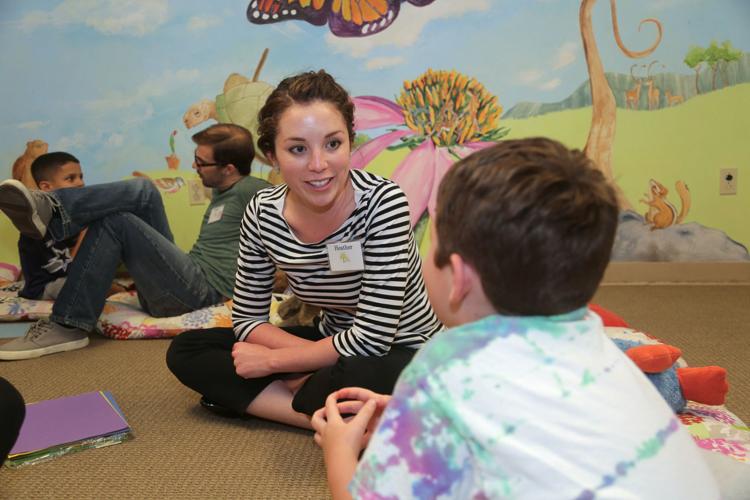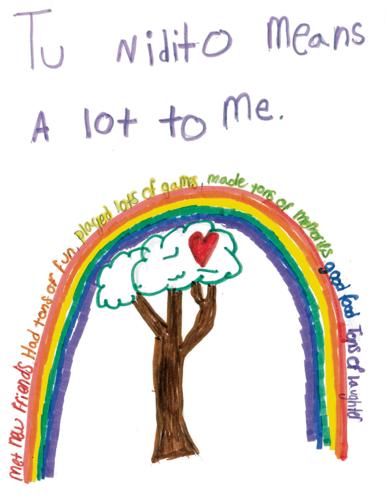When kids are acting out and not focusing at school, the problem might be grief.
Based on demand and the prevalence of local young people who have lost a loved one, the Tucson-based nonprofit Tu Nidito Children & Family Services this month began offering a new, free grief-education program.
The one-hour session is geared toward employees at community agencies, schools or any adult who works closely with children and teens.
One in nine Americans loses a parent by the time they are 20 years old, according to research by the Virginia-based nonprofit Comfort Zone Camp, which provides childhood bereavement camps.
Other children may suffer the loss of a friend, a sibling, or another close family member.
It could be that a teacher died in the middle of the school year. Or a high schooler died by suicide. Or a parent died years ago. Tu Nidito officials frequently respond to all those types of scenarios, which is why they are hoping community grief education will be helpful.
When the adults around a grieving child don’t notice or intervene, that child’s future is at risk, experts say.
EXPERIENCING GRIEF
The grief program, designed by Tu Nidito community impact manager Amanda Marks, aims to promote awareness and understanding of children’s grief over losing someone to death. Tu Nidito will go out to agencies or have people attend sessions at its central Tucson location at 3922 N. Mountain Ave.
Children grieve differently than adults, Marks said during a recent session attended by local school counselors and social workers. And she’s talking about all kids from infants to 18-year-olds.
Teenagers may look like adults, but they are still children and need unique and focused attention when they go through a loss, said Marks, who is a licensed social worker.
For one thing, kids will typically grieve in different ways throughout their developmental stages. So a child may begin acting out years after a loved one has died because as they mature they are re-experiencing grief in a new way, Marks said.
Grief is not linear. It lasts for a as long as it lasts, Tu Nidito officials say.
“It’s not that a school subject isn’t interesting to them. You just never know,” Marks said. “It could be the anniversary of their dad’s death. It could have happened six years ago but the child has hit a new developmental milestone.”
THREE TASKS OF GRIEVING
Kids may also regress and wet the bed or insist on sleeping with a parent because of a death.
“Anyone in the community can become aware of the milestones and be better equipped to support that child,” Marks said.
The session takes participants through what Tu Nidito officials have identified as three main tasks children face as they grieve. The tasks were developed from Harvard psychologist J. William Worden’s often-cited “Four Tasks of Mourning.”
The three children’s tasks identified by Tu Nidito: The child wants to understand what has happened when a significant loss has occurred; the child wants to express their feelings about loss; and the child wants to continue to live fully in the present and open up to the future.
‘NO CHILD GRIEVES ALONE’
Tu Nidito, which has a motto of, “No Child Grieves Alone,” has a sole focus of supporting children, teens and families who are grieving the death of a loved one or are facing a serious medical diagnosis.
The name “Tu Nidito” means “your little nest” in Spanish and refers to the 20-year-old organization’s aim of providing a safe place for kids.
“It’s quite often that I see children endure deaths in the family. Where I am a counselor there are lots ot tatas, nanas, tios and tias, a lot of extended family,” said Ed Rothlisberger, a counselor in the Tucson Unified School District who attended a recent grief education session taught by Marks.
“We have to help them out. It is hard to focus on schoolwork when they are grieving. We need resources for kids.”
Preparing herself with tools and information she will inevitably need in her career is why TJ Von Isser, a social work intern at Mission View Elementary School, attended the session.
She values knowing the services the agency provides in the community, including at local Boys and Girls Clubs. And Von Isser was impressed with the agency’s approach to handling grief in children through peer support and play rather than adult-child talk therapy.
“I’m here for information gathering, knowing how to support children when the topic comes up,” Von Isser said.
Nearly 70 percent of teachers in the U.S. has at least one student in their class who has lost a parent, guardian, sibling, or close friend in the past year, a 2012 study by the New York Life Foundation and the American Federation of Teachers found. That same study found only seven percent of the teachers surveyed had received bereavement training.
Failure to address a child’s grief can result in devastating outcomes like delinquent behavior, alcoholism, incarceration, running away and mental health issues, experts say.
AVOID ‘PASSED AWAY’
Anyone old enough to love is old enough to grieve, said Marks. She said infants younger than six months old can sense an absence.
She urges adults to be truthful when they talk about death and to stay away from more vague terms like “passed away.” Use more concrete words like “dead,” and a clear explanation, like “their body stopped working,” she advises.
Admit it when you don’t know the answer, and empower children by involving them in the dying and mourning process. That means describing in detail what to expect at a funeral, for example, and giving children the option of being there, Marks said. Tell them how many people will be there and how long will it last. “It’s all about giving them choices,” Marks said.
She also teaches “reflective listening.”
“They are more looking to be heard than for an answer,” Marks said. “They need a safe place where their answer is okay.”





